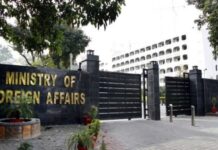
ISLAMABAD, Feb 16 (APP):Federal Minister for Human Rights Dr. Shireen Mazari, on Wednesday virtually attended the third extraordinary session of the Ministerial Council of the Women Development Organization (WDO) of the OIC (Organization of the Islamic Cooperation).
This was on the special invitation of the chair of the Ministerial Council of WDO and President of the National Council for Women in Egypt.
In her address, she said the forum had provided a space for meaningful dialogue on advancing women.
Empowering women and protecting their rights was a central pillar of Pakistan’s development paradigm, she said adding, the constitution of Pakistan guaranteed fundamental rights to both men and women in the light of Islamic injunctions and provided guarantees to women against discrimination and exploitation.
She added that Pakistan was also a signatory to several international commitments on gender equality and women’s rights including the Universal Declaration of Human Rights, Beijing Platform for Action, the Convention on the elimination of all forms of Discrimination Against Women and the Sustainable Development Goals.
The government of Pakistan had taken concrete steps towards strengthening legislation related to violence against women, harassment, economic participation and inheritance, the minister said.
Recently, protection against Harassment of Women at the Workplace (Amendment) Act, 2022 had been enacted that was drafted by the Ministry of Human Rights with extensive input from women rights groups and lawyers.
This piece of legislation specifically included domestic workers who were usually at a greater risk of workplace violence and harassment.
She expressed that Women’s Parliamentary Caucus, Human Rights Cells in Courts, Women Police Stations, nationwide helplines, National and Provincial Commissions on the Status of Women, Provincial Women Development Departments and Directorates and a Women’s Bank and establishment of National Human Rights Complaint Cell were few successful strides towards the institutional framework in Pakistan to protect women rights.
The minister stated that the incumbent government’s broader flagship social protection program was aimed to ensure women’s financial inclusion and economic empowerment.
The Kafaalat program had successfully been rolled out, driving financial and digital inclusion for around eight million women, she said adding, the government had announced a minimum 10 percent quota for women in public sector employment to encourage women’s participation in the workforce.
Our National Action Plan on Business and Human Rights was another milestone for improving the industrial working conditions, placing special focus on women’s labor participation and safe working conditions, Mazari said.
She said Covid-19 pandemic had highlighted the crucial role women play globally in shaping a more equitable future.
However, the pandemic had also highlighted the disproportionate burdens that women confronted, particularly during public health and economic emergencies.
Women across the world had also faced an alarming increase in instances of domestic violence, unemployment and poverty.
Our Ministry specifically prioritized addressing domestic violence during lockdowns by running nationwide media campaigns and embedding a special code in our helpline so victims could report domestic violence even in the presence of perpetrators.
She asserted that she would be amiss if at this point of time, she had not drawn attention to the violence and oppression being perpetrated on the women and children in Indian Illegally Occupied Jammu and Kashmir and the Muslim women in India.
She demanded that the Organization of Islamic Cooperation must move to act against the violence against Muslim women in an increasingly intolerant India under the Hindutva Bharatiya Janata Party government and as an Ummah they also had to effectively counter the Islamophobia in the Western countries.
In her concluding remarks, she said Pakistan firmly believed that they could not effectively achieve economic growth, sustainable development, peace or prosperity without gender equality.
She thanked the organizers for spearheading the cause of gender equality in Islamic Countries and expressed hope to continue strengthening relationships with other Islamic countries to forge ahead to empower women.